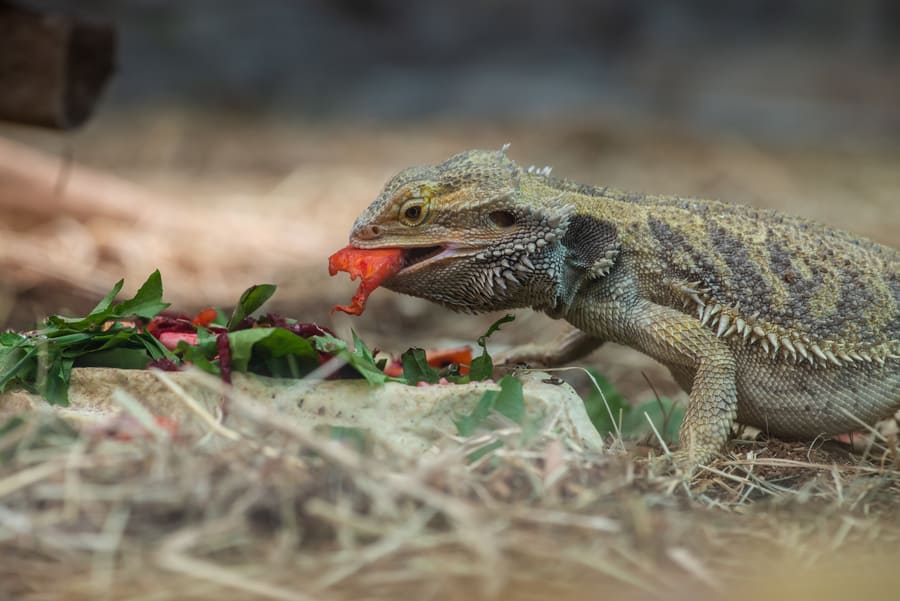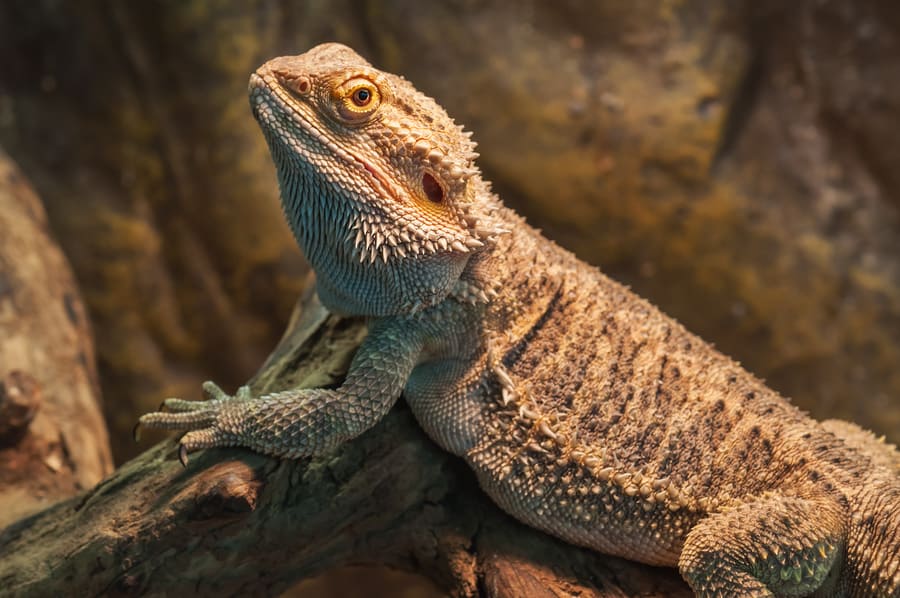
Once you become the owner of a bearded dragon, you’re responsible for providing it with an omnivore-friendly diet. A diverse range of foods will keep your beardie healthy. There are absolutely some foods you should avoid feeding your pet.
Never feed bearded dragons citrus fruit, avocado, fish, fireflies along with other wild-caught insects, nuts, oats, processed meat, or tomatoes. These foods can cause indigestion, impaction, malnutrition, and even death among other ailments.
You must be cautious as some foods are toxic to bearded dragons. Others may cause choking, indigestion, impaction (bowel obstruction), malnutrition, and vomiting. If it eats certain greens too often, your pet might get Metabolic Bone Disease (MBD) because of poor calcium absorption.
Overwhelmed by the idea of making a mistake? We’ve got you covered with this comprehensive guide to safe and bad foods for bearded dragons.
Which Foods Should You Never Feed to Bearded Dragons?
Avocado
This fruit is enjoying a surge in popularity among the health-conscious, but beware when it comes to beardies. Avocados contain oxalic acid, which can be deadly to beardies if eaten in bulk. Even a small quantity could make your pet quite ill.
Citrus Fruits
Oranges, tangerines, grapefruit, limes, and lemons are all rich in vitamin C. Unfortunately, they are also acidic, which can cause indigestion in bearded dragons. Omit these sour fruits from your pet’s diet.
Fireflies
You might be tempted to catch lightning bugs to feed your pet as an easy (and free) treat. However, fireflies could kill your pet. In case you allow your beardie to roam outdoors, ensure it doesn’t catch fireflies and other wild insects. Many wild-caught insects will contain diseases and even parasites that can make your beardie sick.
Fish
Bearded dragons do not coexist in the wild with marine creatures, so they are not part of your beardie’s natural diet. Your pet will find it difficult to digest fish meat, bones, and scales.
Nuts
Never feed nuts to your beardie, including almonds, cashews, peanuts, and walnuts. While they provide protein, nuts also contain a lot of fat and phosphorus. Plus, they can lead to indigestion, impaction, or choking.
Oats
Oats are full of fiber and considered healthy for humans. For bearded dragons, not so much. Since oats absorb water, they will swell up in your beardie’s tummy and clog up its bowels. Do not add oats to your pet’s bedding or substrate.
Processed Meats
Bearded dragons should never eat bacon or other processed meats. The same goes for pet food, whether wet or dry. Your pet’s digestive system cannot break down high quantities of fat, salt, and meat. If they eat these too often, your beardie may suffer from kidney or liver diseases.
Tomatoes
Like citrus fruits, tomatoes are rich in vitamin C, making them too acidic for your bearded dragon. Plus, they contain a high amount of phosphorus.
Which Foods Can You Feed Sparingly to a Bearded Dragon?
Asparagus
The food option is acidic and has disproportionate calcium and phosphorus ratios. Although bearded dragons can consume this vegetable raw, offer it only once a week or less.
Bananas
Your beardie can eat raw bananas but as a rare treat. Otherwise, they can make your pet sick due to its sugar content. Give bite-sized pieces of bananas in case you haven’t stocked up on other items.
Beet Tops
The leafy sections of beetroots contain high levels of vitamin A and magnesium. However, this nutritious vegetable also has a chemical that hinders calcium absorption in reptiles.
You can still feed this to your pet, but limit the portion to a few pieces each month.
Boiled Eggs
Beardies can consume eggs in small quantities. However, you shouldn’t give eggs as a staple food. Instead, offer half a boiled egg twice a month. Your pet can eat a smaller egg, say a quail egg, once a week.
Make sure you remove the eggshells, as the sharp pieces can cut your pet dragon’s mouth and esophagus.
Broccoli
Your pet should eat broccoli in moderation because excessive quantities can suppress your pet’s thyroid functions. Broccoli can be a substitute until you stock up. You can feed them on the vegetable’s leaves and stalks, provided they are chopped finely. Limit to a few pieces every two weeks.
Cucumbers
These summer vegetables do not have a lot of nutritional value for bearded dragons. Eating too much can cause an upset stomach and loose bowels in your pet. If you do offer cucumbers, make sure they are peeled and minus the leaves.
Figs
Dragons can enjoy raw figs weekly for added calcium and fiber. Figs are typically dried, so you want to cut them into pieces first before feeding them to your pet.
Kiwi
Beardies love kiwi, but you should use it as a treat rather than as part of their normal fare. While kiwi is full of vitamin C, it has high quantities of oxalic acid. Instead, give them kiwi once every two or three months.
Lettuce
While bearded dragons love this crunchy salad staple, you shouldn’t give them lettuce too often. Lettuce doesn’t offer any nutritional value for the reptile and could lead to digestive troubles and diarrhea. At best, lettuce (ice, romaine, etc.) should only serve as emergency food.
Parsley
Bearded dragons can consume parsley, but not too often.
Pumpkin
Raw, seedless pumpkin is an effective remedy if your dragon is constipated, but don’t offer it too frequently. Otherwise, it could lead to diarrhea. A safer alternative is squash, which can serve as a staple food.
Raspberries
Although bearded dragons enjoy raspberries, they aren’t suitable for frequent consumption. The fruit isn’t the best for the animal because they contain oxalates, so limit this as a rare treat.
Strawberries
Beardies can eat strawberries occasionally. Ideally, you should feed them once a month or every two months. Just make sure that you take out the top part and slice it into tiny bite-sized pieces for your pet to enjoy.
Spinach
Another food worth avoiding is spinach. Although it’s healthy for humans, it has comparatively high quantities of calcium and iron. The vegetable functions as a calcium binder in bearded dragons, making it hard to digest. Offer it only once a month or less.
Watermelons
Like cucumbers, watermelons don’t provide much in the way of vitamins and minerals. It does have some fiber and a lot of water, which your beardie needs. Make sure you slice off the rind and remove the seeds, then chop into manageable chunks.
Which Foods Are Toxic to Bearded Dragons?
Acidic Foods
Beardies shouldn’t consume fruits like lemons, grapefruit, tomatoes, and oranges. Vinegar is also forbidden. The acidity content in them can be extremely high and could seriously disrupt the digestive tract. Your pet may suffer from runny stools and other digestive problems.
Acorns and Oak Leaves
Don’t include these in your pet’s diet because of their hazardous tannin content. The same warning applies to other parts of the oak tree.
Butterflies and Caterpillars
Several species are poisonous to bearded dragons. Keep in mind that these insects consume all kinds of plants, many of which have toxins that could be dangerous for your beardie. Butterflies and caterpillars may also have been exposed to pesticides or herbicides.
Pine Needles
Bearded dragons and pine trees do not mix. If you have a bearded dragon at home, it’s time to ditch the living Christmas tree. Your pet will get poisoned by the tree’s needles, sap, and fumes. Take note that juniper and other conifers are also dangerous for your pet.
Dangerous Flowering Plants and Trees
Some flowering plants can prove deadly to your pet. Make sure your gardens and home are free from these harmful florals: azaleas, boxwood, iris, hydrangea, poinsettia, tulip, buttercup, holly, wild daffodil, rhododendron, and mistletoe.
Eggplants
Eggplants, whether cooked or raw, are extremely acidic for bearded dragons. It’s better to be safe than to risk offering this toxic vegetable.
Elderberries
Humans consume its cooked berries and leaves for medicinal purposes. However, all the parts of this plant are poisonous to your beardie, especially when eaten raw.
Garlic, Leeks, and Onions
Onions, garlic, leeks, and scallions are commonly used to add flavor to various dishes. If you’re a fan of these members of the allium family, make sure you don’t share them with your pet. These vegetables are toxic to bearded dragons.
Wild Insects
It might seem like a good idea to catch bugs for your pet. After all, it lets you save money and perhaps eliminate pests from your yard. However, you should avoid giving your bearded dragon wild insects. Insects may harbor parasites that can spread to your dragon. These insects may also have traces of pesticides or herbicides in their systems.
Again, do not feed fireflies to your pet beardie. The chemicals that give lightning bugs their signature glow can kill a bearded dragon.
Stinging Insects
While bearded dragons are tough, you want to avoid feeding them scorpions, centipedes, and bees. These insects could injure your pet through stinging or biting. If your pet ingests them, it will also ingest the venom, which could cause sickness or even death.

How Can You Help a Beardie If It Ate Something Bad?
Bearded dragons are inquisitive animals, so there’s always a small chance that your pet may have eaten something harmful. You don’t need to watch your beardie 24/7. However, stay alert for any of these symptoms:
- Vomiting
- Lack of appetite
- Diarrhea
- Loss of weight
- Lethargy
When Should I Bring My Bearded Dragon to the Vet?
If you notice that your pet has thrown up more than once, or if it is throwing up mucus or blood, seek professional help immediately.
What Should You Do at Home for a Sick Bearded Dragon?
A vet should always be your first recourse if you suspect that your pet has eaten anything poisonous.
- Keep them hydrated. When your pet throws up, they run the risk of dehydration.
- Give them activated charcoal to help them get rid of the toxic substance.
- Get samples of its vomit and waste for testing.
Remember that these tips do not take the place of professional medical advice.
What Should You Feed Bearded Dragons?
Fruits and Vegetables
Make sure you wash them thoroughly. If necessary, peel and cut into bite-sized pieces.
- Apples
- Blueberries
- Grapes
- Squash
- Mango
- Carrots – Provide fresh, grated carrots every week or less.
Daily Greens
Your bearded dragon will enjoy a variety of textures and tastes. Include nutrient-dense greens that offer high amounts of calcium, fiber, and vitamins. Offer these raw:
- Arugula
- Collard greens
- Dandelion leaves
- Escarole
- Mustard greens
- Prickly pear
- Turnip greens
Weekly Greens
The following greens are safe for your pet if offered weekly or biweekly. Don’t include them in the daily diet, as they contain some goitrogens, oxalates, or phosphorus. When consumed too often, these vegetables may have a negative effect on your pet’s health.
Cut and tear these vegetables into tiny sizes when feeding your pet.
- Bok Choy – Give this vegetable every other week.
- Cabbage – Red cabbage has fewer goitrogens, so you can offer this every week or so. Green cabbage is best eaten once every 10-14 days.
- Celery Leaves – Make sure you chop them finely, as the stringy stems are a choking hazard.
- Herbs – Your pet will appreciate the strong taste of fresh basil, cilantro, dill, lemongrass, mint, oregano, rosemary, sage, and thyme.
- Kale – Beardies can enjoy this every other week.
- Watercress – This vegetable has some oxalates, so limit intake to every other day.
Protein
- Insects and Worms – Always purchase them from a trustworthy pet shop. You can also cultivate them at home in secure containers.
- Mice – They are a safe but optional protein source. However, you should only feed them to adult beardies. Make sure you are using feeder mice you buy. Do not use wild mice as they are likely to carry disease.
Bearded Dragon Feeding Tips
- Monitor the portion size. Don’t feed him anything broader than the space between the eyes. Big chunks could cause choking, impaction (bowel obstruction), or place pressure on the spine.
- Overfeeding can cause obesity, so avoid it for health concerns.
- Young beardies require foods rich in protein like worms and insects, along with greens. In contrast, mature bearded dragons need more vegetables and fruits in their diet.
- When consuming insects and plants, bearded dragons can ingest tiny bits of gravel or sand accidentally. This could potentially cause severe health concerns. Avoid feeding them sand or loose substrate.
- Make sure you provide clean fresh water for drinking. Ideally, you should change the water and clean their drinking bowls every day.
Bottom Line
The decision to own a bearded dragon as a pet comes with responsibilities. These include offering a natural and comfortable habitat as well as making sure they consume nutritious fare.
Remember, your bearded dragon’s diet must replicate what it would consume in the wild. With this list, you can meet your pet’s nutritional needs safely.
